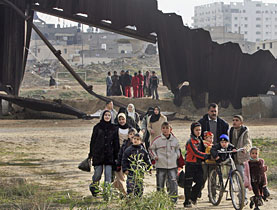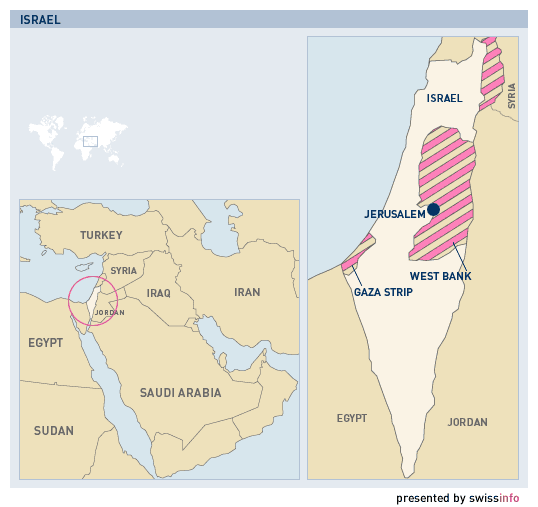
Swiss fear Gaza crisis

The international community cannot solve the problems caused by Israel's closure of the Gaza Strip, says the Swiss Agency for Development and Cooperation (SDC).
Although the Swiss foreign ministry has repeatedly called for an end to the firing of rockets from Gaza into Israel, it describes the Israeli blockade of Gaza as “collective punishment”. Israel rejects the description.
“If the current blockade continues, a humanitarian crisis is inevitable,” Mario Carera, head of the SDC office in the West Bank and Gaza, told swissinfo.
Israel had reduced the supply of electricity and fuel to the Gaza Strip since October and cut it off completely in the middle of January. “Although the blockade was lifted slightly on Tuesday, the impact of the fuel shortage can still be felt,” Carera said.
The three main hospitals in the Gaza Strip have had to suspend some of their emergency services. The pumping of water has been seriously affected, as has the treatment of waste water. The fuel shortage is also having a serious impact on the heating of homes and on work in offices, Carera explained.
“On my last visit last week, I felt a mood of immense despair and resignation in Gaza,” he added.
“The entire Palestinian population has been hard hit by the measures taken by the Israeli government, especially since Hamas won the elections of January 2006, which were recognised by the international community as free and fair. And they have been even harder hit since Hamas took control of the Gaza Strip in June 2007.”
The economic impact has been disastrous. Some 100,000 Palestinians have lost their jobs.
“One salary supports on average eight people. Today 80 per cent of Gaza’s population depends on food aid,” Carera said.
The limits of international aid
“Every month the international community increases its financial support to Gaza via various international agencies and a network of Palestinian non-governmental organisations. But that does not solve the problems arising from the closure of the Gaza Strip,” he said, pointing out that obstacles were frequently put in the way of humanitarian convoys.
Despair is having an impact on the mental health of the population.
“Switzerland supports medical programmes treating mental health problems. In the past few months they have revealed an increase in violence, within families and between rival groups, as well as that aimed against Israel.”
Despair is also radicalising part of the population, Carera warned.
International concern
Israel has been widely criticised for its actions. The Swiss-run International Committee of the Red Cross (ICRC) has spoken of the “immense human cost” of the blockade.
At a meeting of the UN Human Rights Council in Geneva on Wednesday, Switzerland called on both sides to end the “logic of reprisals”.
However, like the countries of the European Union, it abstained when the Council voted on a resolution calling for an end to the Israeli blockade. The resolution did not mention Palestinian rocket attacks on Israeli citizens. It gained the support of 30 members of the 47 member-council.
Israel rejects the criticism. “The current situation in Gaza is the result of a series of bad choices made by the Palestinians, namely violent, terrorist actions rather than peace negotiations,” said Uri Rothman, spokesman for the Israeli embassy in Bern.
“More than two years ago Israel chose to leave the Gaza Strip in order to open up new prospects for peace in the region. But since Hamas took over control of the Gaza Strip in June 2007, more than 2,000 rockets and mortars have been fired at Israel – in other words, one rocket every three hours.”
Rothman also denied that a humanitarian crisis threatens. “We have never halted the supply of electricity nor of essential goods,” he said. He accused the Palestinians themselves of having attempted to attack the Ashkelon power plant, which supplies 70 per cent of the Strip’s power.
swissinfo, based on an article in French by Frédéric Burnand in Geneva
Israel closed all borders with Gaza on January 17 after a series of operations against militants in the Strip.
The pretext for the Israeli actions is the repeated shelling of the Israeli town of Sderot close to the border with Gaza.
Despite the border closure, tens of thousands of Palestinians crossed from the Gaza Strip into Egypt on Wednesday in order to buy supplies.
They were able to get through after militants blew up parts of the six-metre fence which Israel erected along the Gaza/Egypt border in 2004.
Egypt has said it will not use force to send the Gazans back.
Israel is concerned that the open border will enable militants to smuggle arms into the territory.


In compliance with the JTI standards
More: SWI swissinfo.ch certified by the Journalism Trust Initiative






























You can find an overview of ongoing debates with our journalists here . Please join us!
If you want to start a conversation about a topic raised in this article or want to report factual errors, email us at english@swissinfo.ch.